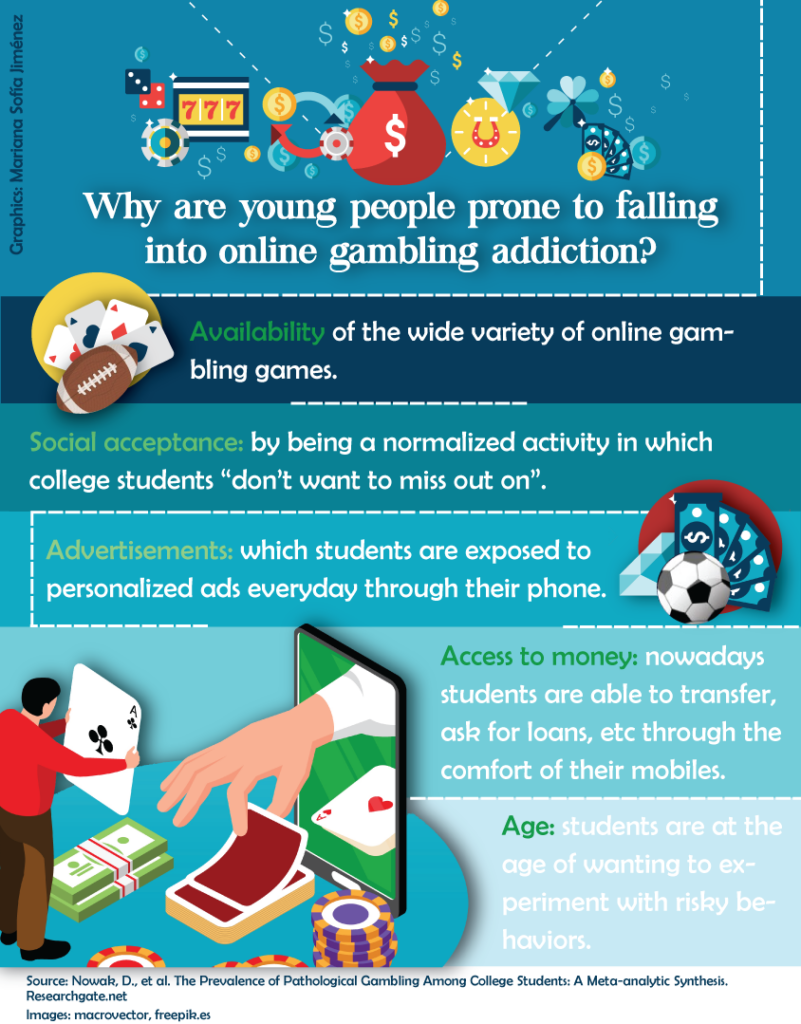Many students stare at their computers or cell phones while the professor teaches in front of a class. Some may be taking notes or pictures of the board; others may be messaging a friend or checking their Instagram notifications. The latter may be temporary and harmless activities where students quickly return their attention to class. However, other activities are being frequented by students inside and outside the classroom, which can bring adverse outcomes to the well-being of students: online gambling.
The internet has brought a myriad of benefits to the palms of our hands, but it has also facilitated some addictions. Compulsive gambling is a disease characterized by the inability to control the impulses to play electronic games or gamble; people’s reactions to it are similar to what drug addicts would feel. It is a severe psychological disorder usually associated with adults or elderly people. Still, today, it has become a severe problem for young university students.
In the United States, the percentage of people between 18 and 24 who are addicted to gambling increases yearly. According to the National Council on Problem Gambling (NCPG), a U.S. non-profit organization dedicated to minimizing the economic and social harm associated with problem gambling, 6% of college students in the U.S. have a gambling addiction, a large percentage, considering that 2% to 3% of American adults are estimated to be addicted to gambling.
So why is there an increase in young people who gamble? In part, it is due to young people’s familiarity with social networks, whose small pangs of dopamine get combined with the excitement of gambling, all in one device.
Smartphones are also very convenient, as people do not need to go to a physical establishment. With their phones, they can place bets from the comfort of their rooms or even within the classroom without interrupting their schedules. Equally, some gamble as a way to cope with school stress or to occupy their free time.
Also, gambling through electronic devices can generate a sense of security in young people because they can present themselves anonymously and feel that their identity is safe.
The applications or websites offer advertising that can be very attractive to young people, with promises of winning incredible prices or doubling their money. It is also notable to consider the prevalence of video games, which have features similar to gambling, making students feel intuitively familiar with these types of games.
Donald Nowak and Ariel Aloe, researchers at the University of Buffalo, have identified five elements that make students more likely to succumb to gambling addiction:
- The availability of a variety of betting opportunities offered by personal devices.
- The social acceptance of gambling, an increasingly popular and common activity among students who do not want to miss the opportunity to win money.
- Advertising exposure, which is increasingly personalized and adaptable to the way people surf the web.
- Access to money, where digital advances have favored the speed at which people can transfer and borrow money and resources that speed up how they can obtain it. Unfortunately, this convenience also allows students to divert the funds intended for their school expenses, which leads to family problems.
- The age at which young people experiment with various behaviors, especially those that are daring or risky.

The most common games university students place bets in are sports games, which provide infinite real-time offerings. They have various categories (such as the number of yards a particular American football player will run or the number of goals a given soccer team will make in a game). Notably, other ways of betting for young people include video games, cryptocurrency trading, and buying and selling shares of stock.
Unfortunately, problem gambling is not an easy disease to identify. It is often distinguished by the fact that there are other mental illnesses involved. Still, some observable patterns indicating young people beginning to develop or having an addiction to games include:
- Appearance of unjustified expenses.
- Changes in various aspects of life, such as routines and friendships.
- Decreased school performance.
- Permanence of emotions such as nervousness, worry, and apathy.
- Fatigue, lack of motivation, lying, or making excuses.
Treatment for people with this problem can include attending group sessions (in the United States, associations such as Gamblers Anonymous) or therapy with a psychologist.
Students’ online gambling is an almost invisible addiction with severe consequences, and universities, professors, and family members must address this issue to raise awareness among students and prevent the disorder from spreading. In this way, young people can make responsible decisions in a changing environment in which they can be informed and feel supported by their loved ones and the institution to which they belong.
Translation by Daniel Wetta
This article from Observatory of the Institute for the Future of Education may be shared under the terms of the license CC BY-NC-SA 4.0 
)
)


)